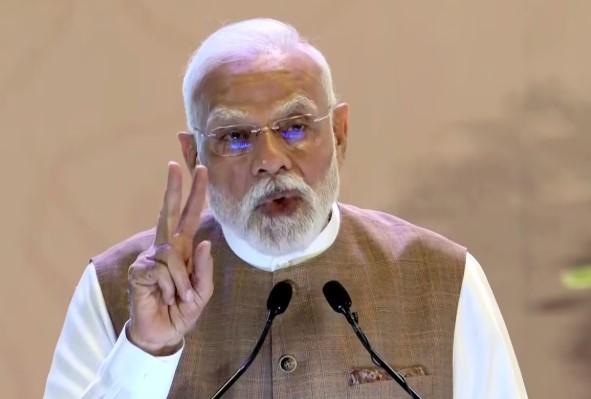Prime Minister Narendra Modi on October 9 said India’s transformation over the past decade has made it an attractive investment destination, highlighting this is “the best time to invest, innovate and make in India.”
Speaking at the inaugural session of the India Mobile Congress 2025, Modi said India’s democratic setup, ease of doing business and reform-oriented approach had cemented its image as an investor-friendly nation.
“Our democratic setup and welcoming approach and ease of doing business has ensured our image as an investor-friendly nation,” the PM said.
Manufacturing to Mobility
Highlighting India’s progress across sectors, Modi said the country’s energy and opportunities span the full technology spectrum—from manufacturing and semiconductors to electronics and mobility.
“From manufacturing to semiconductors, and from mobiles to electronics, India has enough opportunities and energy,” he said, urging global and domestic companies to participate in India’s growth story.
He noted that India’s electronic production has risen sixfold since 2014, while mobile manufacturing has grown 28 times and exports have surged 127 times.
“People used to make fun of Make in India, saying we wouldn’t be able to create technologically advanced things. The country has answered,” Modi said, recalling how India moved from "struggling with 2G connectivity" to achieving 5G coverage across "every corner of the country".
Digital Self-Reliance and 6G Vision
The Prime Minister underlined India’s growing strength in indigenous technology.
“We launched our made-in-India 4G stack—this is a big indigenous development for the country. We are among five nations with our own 4G stack. This is a step towards digital self-reliance and technological innovation,” he said.
Modi announced that the 4G stack is now export-ready, calling it a key milestone in India’s journey toward the Bharat 6G Vision by 2030.
“Digital connectivity is not a privilege or luxury anymore,” he said. “India has manpower, mobility and mindset. We have both scale and skill in manpower and the world’s fastest-growing developer population.”
Modern Legal Framework and Cybersecurity Focus
Modi said the government had modernised outdated laws to support the digital economy and innovation.
“India’s tech revolution over the last 10 years needed a modern legal foundation. We have amended laws that were made before any of us were born,” he said. “This new act—the Telecommunications Act 2023—is not just a law but a facilitator. Approvals have become easier.”
He emphasised that cybersecurity is a central priority as India expands its digital footprint.
“We are giving importance to cybersecurity as well,” Modi said.
2025: The Year of Reforms
Calling 2025 a “year of major reforms,” Modi said the government is determined to accelerate structural changes and strengthen India’s innovation ecosystem.
“We are increasing the pace of reforms. Our innovators and industry have more responsibility now,” he said, urging closer collaboration between startups and established firms.
“The speed of startups and the scale of established players will benefit us. We need to see where there are gaps in the global supply chain and how we can provide solutions.”
The Prime Minister said India is working on 10 semiconductor manufacturing units and positioning itself as a reliable partner in the global supply chain.
“As the world creates more data, storage, security and sovereignty will become even more important. India can become a global data hub,” Modi added.


